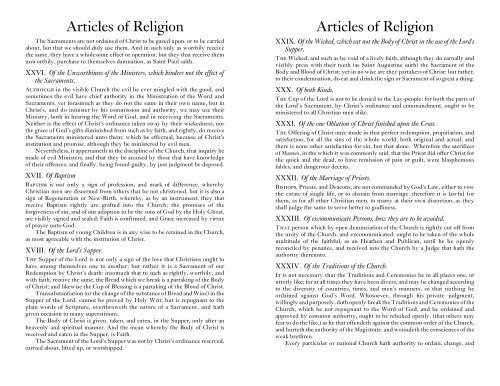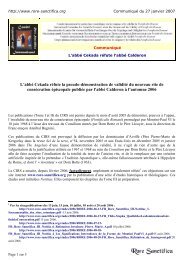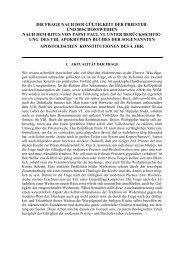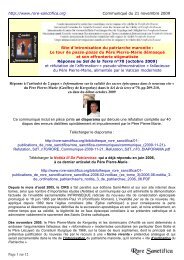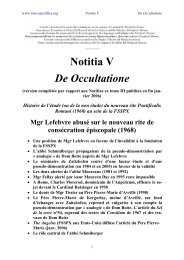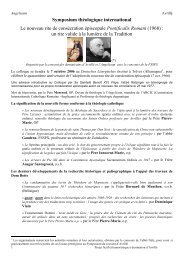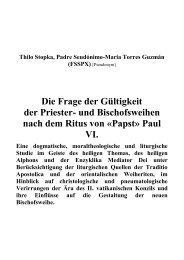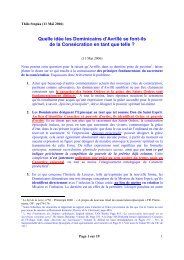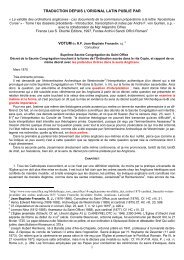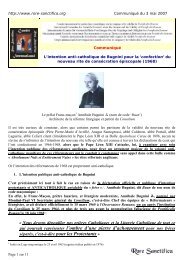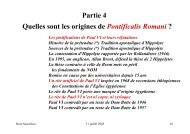The 1928 Book of Common Prayer, The Standard ... - Rore Sanctifica
The 1928 Book of Common Prayer, The Standard ... - Rore Sanctifica
The 1928 Book of Common Prayer, The Standard ... - Rore Sanctifica
Create successful ePaper yourself
Turn your PDF publications into a flip-book with our unique Google optimized e-Paper software.
Articles <strong>of</strong> Religion<br />
<strong>The</strong> Sacraments are not ordained <strong>of</strong> Christ to be gazed upon, or to be carried<br />
about, but that we should duly use them. And in such only as worthily receive<br />
the same, they have a wholesome effect or operation: but they that receive them<br />
unworthily, purchase to themselves damnation, as Saint Paul saith.<br />
XXVI. Of the Unworthiness <strong>of</strong> the Ministers, which hinders not the effect <strong>of</strong><br />
the Sacraments.<br />
Although in the visible Church the evil be ever mingled with the good, and<br />
sometimes the evil have chief authority in the Ministration <strong>of</strong> the Word and<br />
Sacraments, yet forasmuch as they do not the same in their own name, but in<br />
Christ's, and do minister by his commission and authority, we may use their<br />
Ministry, both in hearing the Word <strong>of</strong> God, and in receiving the Sacraments.<br />
Neither is the effect <strong>of</strong> Christ's ordinance taken away by their wickedness, nor<br />
the grace <strong>of</strong> God’s gifts diminished from such as by faith, and rightly, do receive<br />
the Sacraments ministered unto them; which be effectual, because <strong>of</strong> Christ’s<br />
institution and promise, although they be ministered by evil men.<br />
Nevertheless, it appertaineth to the discipline <strong>of</strong> the Church, that inquiry be<br />
made <strong>of</strong> evil Ministers, and that they be accused by those that have knowledge<br />
<strong>of</strong> their <strong>of</strong>fences; and finally, being found guilty, by just judgment be deposed.<br />
XVII. Of Baptism<br />
Baptism is not only a sign <strong>of</strong> pr<strong>of</strong>ession, and mark <strong>of</strong> difference, whereby<br />
Christian men are discerned from others that be not christened, but it is also a<br />
sign <strong>of</strong> Regeneration or New-Birth, whereby, as by an instrument, they that<br />
receive Baptism rightly are grafted into the Church; the promises <strong>of</strong> the<br />
forgiveness <strong>of</strong> sin, and <strong>of</strong> our adoption to be the sons <strong>of</strong> God by the Holy Ghost,<br />
are visibly signed and sealed; Faith is confirmed, and Grace increased by virtue<br />
<strong>of</strong> prayer unto God.<br />
<strong>The</strong> Baptism <strong>of</strong> young Children is in any wise to be retained in the Church,<br />
as most agreeable with the institution <strong>of</strong> Christ.<br />
XVIII. Of the Lord’s Supper.<br />
<strong>The</strong> Supper <strong>of</strong> the Lord is not only a sign <strong>of</strong> the love that Christians ought to<br />
have among themselves one to another; but rather it is a Sacrament <strong>of</strong> our<br />
Redemption by Christ’s death: insomuch that to such as rightly, worthily, and<br />
with faith, receive the same, the Bread which we break is a partaking <strong>of</strong> the Body<br />
<strong>of</strong> Christ; and likewise the Cup <strong>of</strong> Blessing is a partaking <strong>of</strong> the Blood <strong>of</strong> Christ.<br />
Transubstantiation (or the change <strong>of</strong> the substance <strong>of</strong> Bread and Wine) in the<br />
Supper <strong>of</strong> the Lord, cannot be proved by Holy Writ; but is repugnant to the<br />
plain words <strong>of</strong> Scripture, overthroweth the nature <strong>of</strong> a Sacrament, and hath<br />
given occasion to many superstitions.<br />
<strong>The</strong> Body <strong>of</strong> Christ is given, taken, and eaten, in the Supper, only after an<br />
heavenly and spiritual manner. And the mean whereby the Body <strong>of</strong> Christ is<br />
received and eaten in the Supper, is Faith.<br />
<strong>The</strong> Sacrament <strong>of</strong> the Lord’s Supper was not by Christ’s ordinance reserved,<br />
carried about, lifted up, or worshipped.<br />
Articles <strong>of</strong> Religion<br />
XXIX. Of the Wicked, which eat not the Body <strong>of</strong> Christ in the use <strong>of</strong> the Lord's<br />
Supper.<br />
<strong>The</strong> Wicked, and such as be void <strong>of</strong> a lively faith, although they do carnally and<br />
visibly press with their teeth (as Saint Augustine saith) the Sacrament <strong>of</strong> the<br />
Body and Blood <strong>of</strong> Christ; yet in no wise are they partakers <strong>of</strong> Christ: but rather,<br />
to their condemnation, do eat and drink the sign or Sacrament <strong>of</strong> so great a thing.<br />
XXX. Of both Kinds.<br />
<strong>The</strong> Cup <strong>of</strong> the Lord is not to be denied to the Lay-people: for both the parts <strong>of</strong><br />
the Lord’s Sacrament, by Christ’s ordinance and commandment, ought to be<br />
ministered to all Christian men alike.<br />
XXXI. Of the one Oblation <strong>of</strong> Christ finished upon the Cross.<br />
<strong>The</strong> Offering <strong>of</strong> Christ once made in that perfect redemption, propitiation, and<br />
satisfaction, for all the sins <strong>of</strong> the whole world, both original and actual; and<br />
there is none other satisfaction for sin, but that alone. Wherefore the sacrifices<br />
<strong>of</strong> Masses, in the which it was commonly said, that the Priest did <strong>of</strong>fer Christ for<br />
the quick and the dead, to have remission <strong>of</strong> pain or guilt, were blasphemous<br />
fables, and dangerous deceits.<br />
XXXII. Of the Marriage <strong>of</strong> Priests.<br />
Bishops, Priests, and Deacons, are not commanded by God’s Law, either to vow<br />
the estate <strong>of</strong> single life, or to abstain from marriage: therefore it is lawful for<br />
them, as for all other Christian men, to marry at their own discretion, as they<br />
shall judge the same to serve better to godliness.<br />
XXXIII. Of excommunicate Persons, how they are to be avoided.<br />
That person which by open denunciation <strong>of</strong> the Church is rightly cut <strong>of</strong>f from<br />
the unity <strong>of</strong> the Church, and excommunicated, ought to be taken <strong>of</strong> the whole<br />
multitude <strong>of</strong> the faithful, as an Heathen and Publican, until he be openly<br />
reconciled by penance, and received into the Church by a Judge that hath the<br />
authority thereunto.<br />
XXXIV. Of the Traditions <strong>of</strong> the Church.<br />
It is not necessary that the Traditions and Ceremonies be in all places one, or<br />
utterly like; for at all times they have been divers, and may be changed according<br />
to the diversity <strong>of</strong> countries, times, and men’s manners, so that nothing be<br />
ordained against God’s Word. Whosoever, through his private judgment,<br />
willingly and purposely, doth openly break the Traditions and Ceremonies <strong>of</strong> the<br />
Church, which be not repugnant to the Word <strong>of</strong> God, and be ordained and<br />
approved by common authority, ought to be rebuked openly, (that others may<br />
fear to do the like,) as he that <strong>of</strong>fendeth against the common order <strong>of</strong> the Church,<br />
and hurteth the authority <strong>of</strong> the Magistrate, and woundeth the consciences <strong>of</strong> the<br />
weak brethren.<br />
Every particular or national Church hath authority to ordain, change, and


